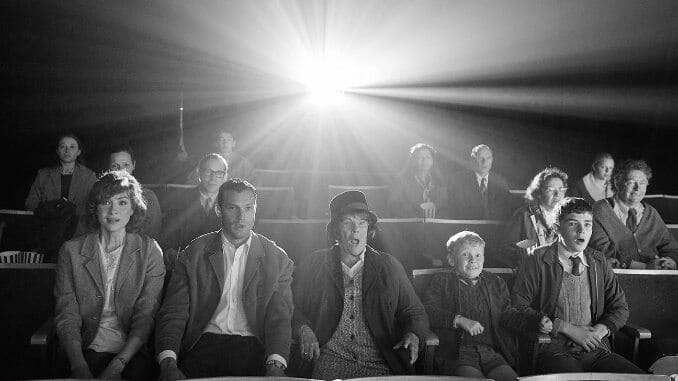Belfast Captures a Singular Time and Place with Gentle Grace and Humor

Way back in 1989, Kenneth Branagh was a brash Irish thespian staging rousing and passionate productions of Shakespeare in ways that brought young eyes back to the Bard, while also making a name for himself. At the time, he also published his autobiography, Beginning. Definitely a ballsy move to write and release at age 29, yet it’s a crackin’ read with a first chapter that now reads as a primer for Branagh’s latest, Belfast.
In his early acting years, Branagh judiciously explored his Northern Ireland roots in theater. In the decades since, he hasn’t dipped back into his heritage on the stage or screen much since those plays or his autobiography. With Belfast, it feels like Branagh spent those interim years ruminating heavily on his past in the ways only time and distance can afford, and he’s poured those rich sense memories into all 97 minutes of this deeply personal film.
Collecting some of his longtime acting collaborators like Judi Dench and Gerard Horan, and some of the best Irish actors working today including Ciarán Hinds, Caitríona Balfe and Jamie Dornan, Branagh forms them into semi-autobiographical versions of his family, friends and neighbors back in the day. They represent three generations of Belfasters, the backbone of his intimate snapshot of late ‘60s Northern Ireland, with Hinds and Dench as Pop and Granny, and Balfe and Dornan as Ma and Pa to young Buddy (newcomer Jude Hill).
Initially introducing audiences to a color-drenched montage of aerial views of Belfast today, Branagh’s camera then slips over a fence and back in time to a black-and-white past seen mostly from Buddy’s point of view. He exists in a seemingly carefree childhood, comforted by his tight knit community. But his peaceful play is quickly shattered by the Troubles invading his mixed religion, middle class street. Housing both Catholics and Protestants, the street becomes a literal war zone that erupts in the middle of the day as Protestants try to physically oust the Catholics from their homes.
Branagh uses Buddy’s inherent confusion about the causes of the violence as an entry point for the audience. He gives us a child’s eye view of the palpable fear and the darkly comedic absurdity of two dogmatic religions battling for societal dominance and the souls of its devout worshippers. A thoughtful young soul, Buddy whizzes about the streets visiting his grandparents, attending school, or even testing the waters of his own rebellious proclivities with older firebrand Moira (Lara McDonnell). Branagh, through Buddy, gives us a street level view of living in the Belfast of the time. And he’s a winning tour guide, serving up the highs and lows of kid life with sincerity, charm and heart.
-

-

-

-

-

-

-

-

-

-

-

-

-

-

-

-

-

-

-

-

-

-

-

-

-

-

-

-

-

-

-

-

-

-

-

-

-

-

-

-








































